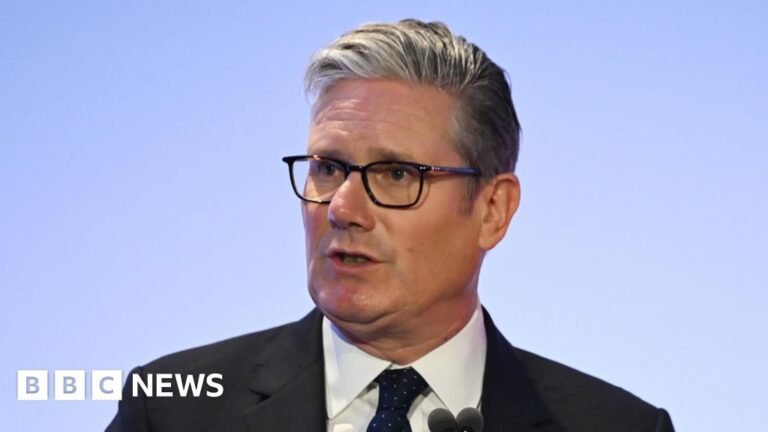Jennifer McKiernan & Sam Francis
Political reporter, BBC News
Henry Zeffman
Chief Political Correspondent
Getty Images
Sir Keir Starmer is considering softening the government’s welfare cuts in an effort to stave off a backbench Labour rebellion.
The prime minister confirmed earlier that talks with rebels were ongoing over making changes to legislation to deliver the proposals.
It comes after more than 120 Labour MPs backed an amendment that would stop the bill progressing through Parliament.
Sir Keir himself has been personally calling some rebel MPs to win them over, ahead of a vote on the bill scheduled for Tuesday next week.
Six more Labour MPs backed the amendment overnight, bringing the total to 126 – around half those Labour MPs who do not hold a government role.
Speaking in the Commons earlier, Sir Keir said he recognised MPs of all parties were “eager” to reform the “broken” welfare system.
“We want to see reform implemented with Labour values and fairness,” he said.
“That conversation will continue in the coming days, so we can begin making changes together on Tuesday.”
The Universal Credit and Personal Independence Payment Bill would change who would qualify for certain disability and sickness benefits.
The bill tightens eligibility requirements for personal independence payments (Pips), halves the health-related element of universal credit (UC), alongside increasing the UC standard allowance.
Ministers have said the legislation, which aims to save £5bn a year by 2030, is crucial to slow down the increase in the number of people claiming benefits.
Working-age health-related benefit spending has increased from £36bn to £52bn in the five years between 2019 in 2024, according to the Institute for Fiscal Studies (IFS), a think tank.
It is expected to double to £66bn by 2029, without changes to the system.
But Labour MPs have criticised elements of the proposals, including plans to require Pip claimants to prove they need a higher degree of assistance with tasks such as preparing and eating food, communicating, washing and getting dressed.
Conservative leader Kemi Badenoch said welfare spending is “out of control” during a speech to the British Chambers of Commerce.
“The state is bloated, productivity has flatlined and the economy is stuck in first gear,” Badenoch said.
Asked for details of which benefits should be cut, she declined to specify, but said welfare was not “designed” to support “behavioural and mental health conditions like anxiety”.
Badenoch pointed to a report by the Centre for Social Justice, which argued cutting mental health benefits for all but the worst cases would save of £7.4bn per year by 2030.
The savings could be used to fund 1.5 million additional therapy courses for people with mental-health conditions, the report argued.
Badenoch argued Sir Keir is in the “fight of his life” despite a large majority because his MPs are “too scared to make difficult decisions”.
On Wednesday, Sir Keir said his party was “pretty united” when it came to the notion of reforming the welfare system.
The prime minister said changes to welfare would be “tough going” but added that “the important thing is to focus on the change that we want to bring about”.
Winter fuel U-turn
One of the main co-ordinators behind the amendment, who did not wish to be named, has told the BBC the government’s U-turn on cutting winter fuel payments had emboldened many of those who have signed the amendment.
They told the BBC, MPs “all voted for winter fuel [cuts] and have taken so much grief in our constituencies, so colleagues think why should I take that on again?”.
It is understood that plans for the amendment began when Work and Pensions Secretary Liz Kendall offered a partial olive branch to rebels by expanding the transition period for anyone losing Pip from four to 13 weeks.
Commons leader Lucy Powell has confirmed the initial vote on the welfare bill is still scheduled for Tuesday next week, with all its further stages in the Commons scheduled for Wednesday the following week.
Louise Murphy, senior economist at the Resolution Foundation think tank, called the longer transition period for Pips “a sensible tweak that should ease the blow for those who are no longer eligible for support”.
But she pointed out that extra funding for employment support – which ministers have been highlighting in their bid to win over Labour MPs – would not come fully into effect until 2029 at the earliest.
